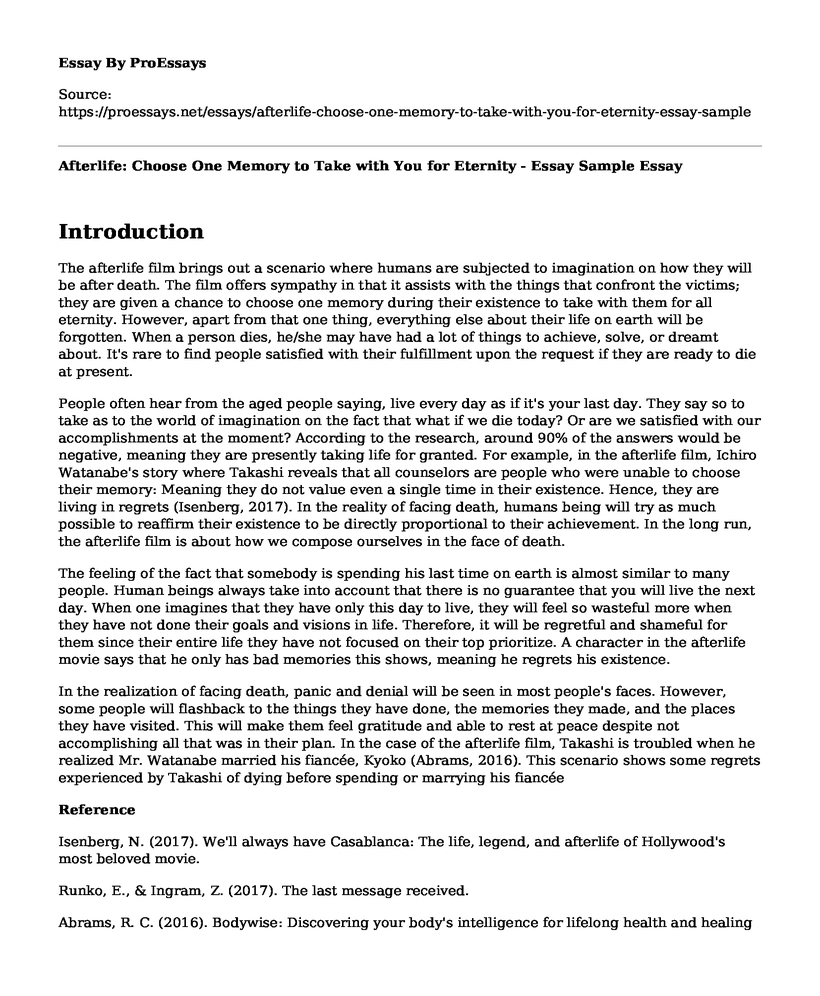Introduction
The afterlife film brings out a scenario where humans are subjected to imagination on how they will be after death. The film offers sympathy in that it assists with the things that confront the victims; they are given a chance to choose one memory during their existence to take with them for all eternity. However, apart from that one thing, everything else about their life on earth will be forgotten. When a person dies, he/she may have had a lot of things to achieve, solve, or dreamt about. It's rare to find people satisfied with their fulfillment upon the request if they are ready to die at present.
People often hear from the aged people saying, live every day as if it's your last day. They say so to take as to the world of imagination on the fact that what if we die today? Or are we satisfied with our accomplishments at the moment? According to the research, around 90% of the answers would be negative, meaning they are presently taking life for granted. For example, in the afterlife film, Ichiro Watanabe's story where Takashi reveals that all counselors are people who were unable to choose their memory: Meaning they do not value even a single time in their existence. Hence, they are living in regrets (Isenberg, 2017). In the reality of facing death, humans being will try as much possible to reaffirm their existence to be directly proportional to their achievement. In the long run, the afterlife film is about how we compose ourselves in the face of death.
The feeling of the fact that somebody is spending his last time on earth is almost similar to many people. Human beings always take into account that there is no guarantee that you will live the next day. When one imagines that they have only this day to live, they will feel so wasteful more when they have not done their goals and visions in life. Therefore, it will be regretful and shameful for them since their entire life they have not focused on their top prioritize. A character in the afterlife movie says that he only has bad memories this shows, meaning he regrets his existence.
In the realization of facing death, panic and denial will be seen in most people's faces. However, some people will flashback to the things they have done, the memories they made, and the places they have visited. This will make them feel gratitude and able to rest at peace despite not accomplishing all that was in their plan. In the case of the afterlife film, Takashi is troubled when he realized Mr. Watanabe married his fiancée, Kyoko (Abrams, 2016). This scenario shows some regrets experienced by Takashi of dying before spending or marrying his fiancée
Reference
Isenberg, N. (2017). We'll always have Casablanca: The life, legend, and afterlife of Hollywood's most beloved movie.
Runko, E., & Ingram, Z. (2017). The last message received.
Abrams, R. C. (2016). Bodywise: Discovering your body's intelligence for lifelong health and healing
Cite this page
Afterlife: Choose One Memory to Take with You for Eternity - Essay Sample. (2023, Aug 28). Retrieved from https://proessays.net/essays/afterlife-choose-one-memory-to-take-with-you-for-eternity-essay-sample
If you are the original author of this essay and no longer wish to have it published on the ProEssays website, please click below to request its removal:
- Tinikling Dance and Its Benefits
- Paper Example on Impact of Social Media on Business
- Critical Essay on Astonishing the Blind by Jack Hodgins
- The Impact of Race on Music Production in America - Essay Sample
- Exploring Hip Hop Music: Beyond Controversies & Social Significance - Essay Sample
- Essay Sample on The Piano: Strings, Keys, and a World of Musical Joy
- Essay Example on Veronica Wang: A YouTube Food Channel with a Huge Following







